Reading view
中国多型舰艇在南中国海实战化训练

中国官媒报道,中国多型舰艇在南中国海展开实战化训练。
央视新闻报道,海军某支队洪湖舰奔赴南中国海某海域,与导弹护卫舰衡阳舰和海军航空兵部队,展开为期数天的跨昼夜多课目海上实战化训练。
报道称,洪湖舰清晨刚抵达预定训练海区,便遭到“浮雷”威胁。洪湖舰快速转入战斗航向,占领攻击阵位。炮手克服风浪等不良影响,不断操纵摇杆调整舰炮射击角度,持续追踪并锁定目标。
报道续称,指挥所果断下达攻击指令,各战位密切协同,前后炮同时开火,成功击毁目标。海上威胁解除后,洪湖舰接到上级命令,立即前出为衡阳舰补给。
洪湖舰与衡阳湖舰进行了液货、干货补给,还相继穿插开展了跨昼夜舰载直升机起降、联合搜救、轻武器实弹射击、编队运动等多个课目训练。
中国声称对南中国海大部分海域拥有主权,声索范围与数个东南亚国家,包括菲律宾重叠。各国在受争议海域里的维权行动、渔业和能源勘探活动不时引发摩擦与冲突。
菲律宾希望在明年出任亚细安轮值主席国期间,能够推动中国与亚细安达成有约束力的《南中国海行为准则》。
陈茂波:地缘政治发展提升而非削弱香港国际金融中心地位
香港财政司司长陈茂波说,地缘政治发展正在提升而非削弱香港的国际金融中心地位。
综合香港电台和新城广播网报道, 陈茂波出席由英国《金融时报》与信和合办的研讨会时致辞说,数个月前美国政策出现重大转变,为全球带来新的不确定性,投资者重新评估风险,寻找具有透明、一致及稳定的政策环境,并有可信监管框架及熟悉法律制度的司法管辖区,也让投资者可以继续追求回报的地方。
陈茂波认为,香港是答案所在,很多金融机构也扩大在港业务。今年初,港股估值只是约12倍,随着全球投资者意识到对中国市场配置不足,吸引大量资金流入。
恒生指数今年以来升约三成,日均成交是去年的两倍多,首次公开发行(IPO)集资额约280亿美元(364亿新元),上市后融资更达610亿美元。资产及财富管理业也强劲增长,首8个月香港注册基金录得净流入450亿美元;银行存款至今增长10%至逾2.4万亿美元。
陈茂波说,地缘政治发展正在提升而非削弱香港的国际金融中心地位,香港也正发展成全球领先的创新科技中心,全球只有少数城市能够做到在这两方面都保持领先地位,并有强劲发展势头。
他说,随着地缘经济格局重塑加快区域经济合作,促进区内贸易及投资,中国与亚细安及中东合作,香港也可发挥关键作用,连结市场及引导资金流动,促成企业合作并提供专业支援。
《鬼灭之刃》在华提前下映?影城排片经理:未得到通知
日本首相涉台言论事件持续发酵,日本影片《蜡笔小新:炽热的春日部舞者们》《工作细胞》暂缓在华上映。另有传言指正在热映的日本动画电影《鬼灭之刃》会提前下映,但影城排片经理称未得到通知。
极目新闻报道,有网友发文称,《鬼灭之刃:无限城篇 第一章 猗窝座再袭》会提前下映。不过,多家武汉影城排片经理称,暂未得到通知。
中国蓝新闻则报道,《鬼灭之刃》第三段密钥已在星期二(18日)发布,密钥是到星期天(23日)晚上11时59分,之前网上发布的《鬼灭之刃》星期四(20日)下映为不实信息。
至于《蜡笔小新》和《工作细胞》,《蜡笔小新:灼热的春日部舞者们》原定于12月6日上映,影片曾在中国各大社交媒体上持续推出宣传物料,为上映预热。奇幻电影《工作细胞》则原定于11月22日上映,该IP也在中国拥有一定群众基础。
报道也引述猫眼平台“待映”片单内容称,《初吻》《昨日青春》等日本影片此前也都原定于今年内上映,但目前尚无确切档期信息。
另据《中国电影报》报道,《蜡笔小新:炽热的春日部舞者们》《工作细胞》等进口日本影片将暂缓上映。
报道称,在《鬼灭之刃:无限城篇 第一章 猗窝座再袭》方面,随着日本首相高市早苗发表涉台言论,立即引发广大中国观众的强烈不满。“受高市早苗奇谈怪论的拖累,此动画电影上映三天后票房已呈显著下滑态势,市场热度快速回落。目前,上映第五日的票房预测已经跌至2000万元(人民币,366万新元)左右。”
《中国电影报》续称,在此背景下,对原拟于近期上映的日本影片,相关进口方和发行方均表示,“日方的挑衅性言论,势必会影响中国观众对日本影片的观感。相关方面将遵循市场规律,尊重观众意愿,决定暂缓上映”。
俞敏洪南极发信贺新东方周年庆 员工称无法与旅游老板共情
中国教育机构新东方创始人俞敏洪在南极考察时于社交平台发内部信,祝贺新东方32周年庆。有员工称无法与在旅游的老板共情。
综合正观新闻和南方都市报报道,俞敏洪星期天(11月16日)在个人微信公众号“老俞闲话”发布上述信函,分享自己在南极的旅游风光,以“浩瀚的洁白、翡翠般的冰山和无边的宁静,冰川在阳光下闪烁着迷人的光芒”描绘南极景观。
俞敏洪称,“在这片远离尘嚣的纯净之地,我热烈祝贺新东方32周年的生日快乐”,在几乎24小时充满阳光,在明媚的阳光下,他向每一位参与过或者正在参与新东方事业的人深表感谢。
他之后简短分享创业历程,并称“一路走来,经历了风雨,也见证了彩虹。这一切离不开每一位曾经在新东方,或今天还在新东方的教职员工的付出与奉献”,于此致以最诚挚的敬意与感谢。
有网民统计,全文提及17次“我”和五次“南极”,鲜少提及对员工当下的工作压力。多名网民在社交平台吐槽称,“满篇看下来,整个脑子都是南极”“全员信更像是俞敏洪的自我感动”等。
有员工在社交媒体调侃“今夜,所有xdfer(新东方人)都是南极人”,暗指老板的“远方”与员工的“现场”形成鲜明对比。
中国蓝新闻星期一(17日)在微博报道上述消息,有网民回应称,“老板:南极了 员工:难极了”“牛马不努力,老板怎么去南极”。
台湾拟将量子计算机和先进半导体设备纳入管制范围
台湾修正军商两用货品及技术出口管制清单,将量子计算机和先进半导体设备纳入管制范围。
综合台湾经济日报和太报报道, 台湾经济部国际贸易署星期一(11月17日)预告修正军商两用货品及技术出口管制清单,除原清单内容修正及勘误外,此次预告高阶3D列印设备、先进半导体设备、及量子计算机共18项列入高科技出口管制清单。
其中先进半导体设备,包括互补金属氧化物半导体(CMOS)积体电路、低温冷却系统、扫描电子显微镜(SEM)设备、低温晶圆测试设备等半导体相关设备等,被列入军商两用货品及技术出口管制清单。
国际贸易署表示,列入军商两用货品及技术出口管制清单,是在国际合作下防阻货品遭用于武扩活动风险,并非禁止出口。业者若出口管制货品,须事先向贸易署申办战略性高科技货品输出许可;若贸易署审核该出口交易无武扩风险,将核予输出许可,准许厂商出口。
上述修正草案预告期为60日,相关产业公协会与业者可于预告期间提供意见。
贸易署强调,经济部每年均参考国际规范,修正上述清单,做法与友盟国家相同。
中国在黄海南部实弹射击 离日本最近离岛约870公里
在中日两国外交风波持续紧张的背景下,中国海事局官网星期一(11月17日)宣布,黄海南部特定海域从星期二(18日)起展开八天实弹射击,地点距离日本最近的离岛约870公里。
中国海事局官网星期一下午4时多发布连云港海事局的航行警告称,11月18日至25日每天早上8时至傍晚6时,在黄海南部诸点连线范围内进行实弹射击,禁止驶入。
《联合报》报道,根据中国大陆海事局公布的实弹射击区域座标,星期二起的实弹射击海域位于江苏连云港东北外海约30公里处,介于江苏连云港与山东日照之间的近海海域,距离日本最近的离岛约870公里,距离日本九州本岛约900到1000公里。
中国海事局官网上星期三(12日)也发布盐城海事局的航行警告称,自11月17日至11月19日在黄海中部连线区域诸点连线范围内,进行实弹射击。香港01曾报道,演习区域接近中韩专属经济区(EEZ)重叠海域,战略敏感性高,或对日、韩及驻韩、驻日美军构成潜在战略压力。
Trump Says U.S. Will Sell F-35s to Saudis, Despite Pentagon Concerns

© Doug Mills/The New York Times
Where Mao’s Peasants Tilled the Soil, Tourists Now Pay for the View

After Climate Push, Energy Companies Return to Fossil Fuels in Europe

© Desiré van den Berg for The New York Times
Tanzania: What to Know About the Post-Election Violence

© Agence France-Presse — Getty Images
Canada narrowly approves Carney's first federal budget

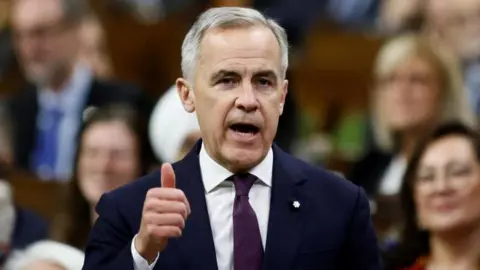 Reuters
ReutersCanada's parliament has narrowly approved Prime Minister Mark Carney's first federal budget, allowing his minority Liberal government to avert an early election.
The fiscal plan, which raises Canada's deficit to a projected C$78 bn ($55.3 bn; £42.47 bn), was passed thanks to crucial support from opposition MPs, including Green Party leader Elizabeth May.
Many opposition lawmakers have sharply criticised the fiscal plan - the second largest in history. The plan passed with 170 votes in favour and 168 against it.
Carney, who served as the former central banker for both Canada and the UK, has defended the budget as a "generational investment" to help Canada strengthen its economy.
The vote was crucial for Carney's Liberal government, which currently sits two seats short of a majority.
It meant that if all 169 Liberal MPs voted in support, the budget would need the backing from either two opposition MPs, or have four opposition MPs abstain.
Two NDP MPs abstained along with House Speaker Francis Scarpaleggia, who casts a vote in the event of a tie. Conservative MPs Shannon Stubbs and Matt Jeneroux - who announced earlier this month that he was resigning - also abstained.
Green Party leader Elizabeth May's support also proved crucial. May told reporters she voted yes based on commitments made by Carney that he would support Canada's climate targets.
"Without what I heard from the Prime Minister today, I would have voted no," she said.
The Conservative Party, led by Pierre Poilievre, and the Quebec nationalist Bloc Québécois both voted against the budget, accusing Carney's government of failing to address affordability concerns.
Poilievre labelled the budget a "credit card budget", arguing it does little to tackle the cost-of-living crisis.
"The Prime Minister's costly deficit gambles our future on the national credit card," Poilievre said in the House of Commons on Monday ahead of the vote.
Liberal MP Nathaniel Erskine-Smith, who supported the budget, raised concerns of his own, suggesting that while the plan offered much-needed investment, it fell short in addressing Canada's housing crisis and stalled progress on climate action.

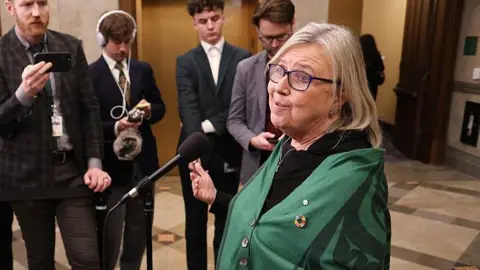 Getty Images
Getty ImagesThe budget proposes C$140bn of new spending over the next five years "to strengthen Canada's productivity, competitiveness, and resilience".
It includes money to update ports and other trade infrastructure with the goal of doubling Canadian exports to non-US markets over the next decade.
Additionally, the plan allocates direct support for businesses hurt by US tariffs on Canadian goods, with Carney's government projecting the initiatives will attract C$1 trillion in private sector investment over the next five years.
To balance the fiscal plan, Carney has proposed cutting the federal workforce by 10% over the coming years - a move that has drawn strong criticism from public sector employees, who cautioned that a leaner federal workforce would slow government operations.
The budget was first put forward in early November, and has already survived two votes.
- Canada's Carney welcomes MP who defected to the Liberals
- Conservatives accuse Carney of being 'undemocratic' as MP resigns
Debate around it had been partially eclipsed by partisan drama between Carney's Liberals and the Conservative opposition, who lost a member of their caucus to the Liberals shortly after the fiscal plan was proposed.
Chris d'Entremont of Nova Scotia said he defected over what he believed was Conservative leader Pierre Poilievre's "negative" style of politics. He added that the Liberal budget "hits the priorities" of his constituents.
Another Conservative lawmaker, Matt Jeneroux of Alberta, later resigned from parliament that same week, saying he did so to spend more time with family.
The departures fuelled questions about Poilievre's leadership. On Wednesday, he told reporters that he plans to stay on as leader.
"My plan is to continue to lead and be the only leader that's fighting for an affordable Canada where our people who work hard can afford a home and food," Poilievre said.
US judge says government 'missteps' may have tainted Comey case

 Getty Images
Getty ImagesA US federal judge says "investigative missteps" and "government misconduct" may have tainted the Trump administration's criminal case against former FBI director James Comey.
In a 24-page opinion, Judge William Fitzpatrick ordered justice department lawyers to release grand jury materials, including transcripts and evidence, to Comey's defence team. The justice department has appealed against the order.
Comey was charged in September after President Donald Trump called for his prosecution and appointed a new federal prosecutor to pursue the case.
Comey, who has long drawn Trump's ire, has pleaded not guilty to the charges, which include obstructing a congressional investigation.
The former FBI chief was fired by Trump during his first term, after Comey led an investigation into Russian election interference in the 2016 US presidential election. Since then, Comey has been a frequent target of the two-term US president.
Comey was accused of lying to lawmakers during a congressional hearing in 2020 about his Russian election interference investigation.
After other federal prosecutors had reportedly declined to pursue the case against Comey, citing lack of evidence, Trump tapped Lindsey Halligan as the lead prosecutor in the case. She secured an indictment three days later.
An indictment in the US justice system is a formal accusation issued by a grand jury - a group of citizens who examine the merits of evidence - to determine if a case should proceed.
Comey was formally charged in October in a federal court in Virginia where he pleaded not guilty.
His defence team has not only taken issue with the legality of Halligan's quick appointment to the role of interim US attorney, a process by which she circumvented congressional approval, but also filed motions over how she brought the Comey indictment.
On Monday, Judge Fitzpatrick wrote that he identified at least two statements Halligan made to grand jurors that could be seen as "fundamental misstatements of the law that could compromise the integrity of the grand jury process".
One statement Halligan made, the judge noted, "suggests" that grand jury "did not have to rely on only the record before them", and that there was "more evidence - perhaps better evidence" that the government had that would be used at trial.
In granting Comey's defence team access to all grand jury materials, Judge Fitzpatrick has also ordered the justice department to hand over complete audio recordings of the proceedings.
"The court recognizes this is an extraordinary remedy," Judge Fitzpatrick said.
He continued: "Under these unique circumstances (it) is necessary to fully protect the rights of the accused."
日本首相国会涉台言论加剧北京和东京之间紧张关系

日本自民党首相提出,如果中国进攻台湾,日本可能会进行军事干预。北京认为这些言论极其严重,并召见了日本大使。中国方面认为此番言论极其严重并强烈反应,任何胆敢阻碍中国统一的人都将面临严厉的报复。台湾入侵的阴影正在加剧北京和东京之间的紧张关系。
日中关系持续紧张。11月初,日本首相高市早苗暗示,如果台湾遭到攻击,日本可能会采取军事干预。据《回声报》报道,中国认为这些言论“极其严重”,并于周五召见了日本大使。尽管收到这一外交警告,东京方面仍未动摇:其对台立场“不变”,主张海峡“和平稳定”并开展对话。
高市早苗在日本国会发表讲话时警告说,如果台湾的紧急情况涉及“部署军舰和使用武力”,则可能“对日本的生存构成威胁”,但她没有点名中国。在这种情况下,部署日本军队保卫台湾岛将属于“集体自卫”的范畴,这是2015年通过的一项法律所规定的。
北京的威胁
北京方面召见了日本驻华大使金杉贤治,以“强烈抗议日本首相的错误言论和行为”。中国外交部副部长警告说:“今天,任何胆敢以任何方式阻碍中国统一伟大事业的人,都将面临中国的严厉报复!”
解放军报也指出;在中方表达强烈抗议后,高市拒不撤回错误言论。这是日本在任首相首次明确可能武力介入台海局势,证实了日本近年来强化军力举措的遏华指向性,暴露了日本政府违背和平宪法,妄图以军事手段干涉别国内政的狼子野心。日方种种错误举动,甚至叫嚣武力介入台海局势,只会把自己引向不归歧途”
以对北京的严厉批评而闻名的日本首相周一在国会表示,她无意收回之前的言论,并坚称这些言论在她看来与东京此前的立场一致。不过,她也澄清说,今后将不再明确提及具体情况。
以对北京的严厉批评而闻名的日本首相周一在国会表示,她无意收回之前的言论,并坚称这些言论在她看来与东京此前的立场一致。不过,她也澄清说,今后将不再明确提及具体情况。
Trump Says America Is in ‘Golden Age,’ Straining to Address Affordability

© Allison Robbert for The New York Times
Tennessee Judge Temporarily Blocks National Guard Deployment in Memphis

© Brad J. Vest for The New York Times
特朗普助力韩国实现核动力潜艇梦想
特朗普助力韩国实现核动力潜艇梦想




贸易商:中粮集团购买至少84万吨美国大豆 下月起装运
两家熟悉交易情况的中国贸易商说,中粮集团(COFCO)星期一(11月17日)至少购买了14船美国大豆,预计在今年12月和明年1月装运。
根据路透社引述两家熟悉交易情况的中国贸易商说,中国国有交易商中粮集团星期一至少购买了14船美国大豆,折合约84万吨。
这是中国自今年1月以来最大规模的采购,也是上个月美国总统特朗普与中国国家主席习近平在韩国举行峰会后最重要的一笔采购。
一名贸易商说,其中有八艘船来自美国墨西哥湾沿岸港口,计划12月和1月装运;其余则来自美国西北太平洋港口,计划1月装运。
贸易商表示,如果更多交易最终敲定,销售总量可能还会进一步增加。
受中国采购利好影响,芝加哥交易所(CBOT)大豆期货星期一大涨近3%,创下17个月以来新高。
中美元首韩国举行会晤后,美国白宫11月初发布清单,称两国元首达成历史性经贸协议。其中,中国将在今年最后两个月购买至少1200万吨美国大豆,在未来三年每年购买至少2500万吨美国大豆。
特朗普上周说,中国将购买美国大豆及其他农产品,预计相关采购已在进行中,并有望在明年春季前完成。
高市涉台言论 新华社:一言可兴邦也可丧邦
中国官方媒体再针对日本首相高市早苗“台湾问题”言论发评论,指一言可兴邦也可丧邦。
中国官方通讯社新华社星期一(11月17日)在题为“高市涉台错误言论极不负责、极其危险”的评论中说,高市早苗7日在国会答辩中就日本安保法中的“存亡危机事态”悍然发表涉台挑衅言论,以可能行使集体自卫权为名,公然干涉中国内政,进行武力威胁。内外压力下,高市10日对国会表示,日本政府对“存亡危机事态”的既有口径没有改变,但坚持不撤回此前答辩言论。
评论指出,一国首相在国会答辩中的任何发言,都会载入公文,具有官方性质。高市一方面宣称政府口径没有变化,一方面拒绝撤回自己作为首相的答辩内容,显然自相矛盾。高市的答辩内容与此前日本政府相关立场相左,没有任何狡辩余地,进一步加剧了外界对其政治诚信和政策稳定性的质疑。
评论说,高市发表极其错误、极为危险、极具挑衅的涉台言论,还不思悔改,拒不撤回,把不负责任发挥到了极致,也把不计后果推升到了极致。这种行为严重违背国际法和国际关系基本准则,严重破坏战后国际秩序,严重违背一个中国原则和中日四个政治文件精神,严重破坏中日关系政治基础,严重伤害中国人民感情。
评论提到,“高市下台”“高市撤回发言”“高市不得煽动战争”等话题标签近日在日本社交媒体上快速增长,足见日本各界对高市一意孤行的强烈不满。日本民众15日晚在到东京首相官邸前抗议,手持标语、高呼口号,对高市近期错误言行表达强烈不满,要求高市辞职。
日本《社会新报》发表的社论指出,高市作为首相的存在本身才是日本的“存亡危机”。
评论强调,一言可以兴邦,一言也可以丧邦。高市涉台错误言论极不负责、极其危险。日本必须深刻反省历史,收回恶劣言论,停止挑衅越线,否则一切后果由其自身承担。
沈伯洋:将继续出国行程 反击大陆威胁
台湾民进党立委沈伯洋被中国大陆立案调查后,被点名可展开“全球抓捕”。前往德国出席议会听证会的沈伯洋星期一(11月17日)说,中国大陆越打压,台湾人越不应屈服,因此此次临时决定不以视频方式,改为亲赴德国国会,自己也将会继续出国行程,反击大陆威胁。
综合联合报和上报报道, 沈伯洋星期一参加民进党发言人吴峥主持的直播节目“午青LIVE”时说,中国大陆恐吓对象不只立委,而是全体台湾人民,必须加以防备。
沈伯洋指出,已要求陆委会加强宣导大陆的危险性。他强调,中国大陆对台心战向来从政治人物、军队开始,除了自己不害怕,也要把这份“不害怕”散播给大家,自己的责任就是把勇气带给更多台湾人。
沈伯洋表示,中国大陆越打压,台湾人越不应屈服;因此这次临时决定不以视频方式,而是亲赴德国国会,尽100%努力,这也是“国会外交的突破”。
他说,现在国际友台力量正在累积,自己也将会继续出国行程,反击中国威胁。
Larry Summers to Step Back From Public Commitments Over Epstein Emails

© David Degner for The New York Times
Shelters plea for Gazans as winter rains raise fears of more disease and death

 BBC
BBCAid agencies have reiterated calls for Israel to allow more tents and urgently needed supplies into Gaza after the first heavy winter rainfall, saying more than a quarter of a million families need emergency help with shelters.
"We are going to lose lives this winter. Children, families will perish," says Jan Egeland, Secretary General of the Norwegian Refugee Council (NRC).
"It's actually so frustrating that we've now lost so many crucial weeks since the adoption of the Trump peace plan, which said humanitarian aid would flow and the Palestinians would not needlessly continue to suffer."
With a majority of the population displaced by two-years of a devastating war, most Gazans now live in tents - many of them makeshift.
They have been clearing up after widespread flooding due to a winter storm that began on Friday.
There are fears that diseases could spread as rainwater has mixed with sewage water.
"My children are already sick and look at what happened to our tent," said Fatima Hamdona, crying in the rain over the weekend, as she showed a BBC freelance journalist the ankle-deep puddle inside her temporary home in Gaza City.
"We don't have food - the flour got all wet. We're people who've been destroyed. Where do we go? There's no shelter for us to go to now."

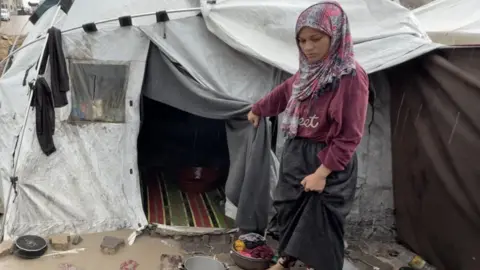
The story was the same in the southern city of Khan Younis.
"Our clothes, mattresses and blankets were flooded," said Nihad Shabat, as she tried to dry out her possessions there on Monday.
Her family has been sleeping inside a shelter made of sheets and blankets.
"We're worried about getting flooded again. We cannot afford to buy a tent."
A recent UN report found that across Gaza more than 80% of buildings had been destroyed and 92% in Gaza City.
According to the NRC - which has long led the so-called Shelter Cluster in Gaza, made up of some 20 non-governmental organisations (NGOs) - about 260,000 Palestinian families, or about 1.5 million people, are in need of emergency shelter assistance, lacking the basics to get through winter.
The NGOs say they have been able to get only about 19,000 tents into Gaza since the US-brokered Israel-Hamas ceasefire took effect on 10 October.
They say they have 44,000 pallets of aid - containing non-food items, including tents and bedding - blocked from entering. Supplies that have been bought are currently stuck in Egypt, Jordan and Israel.
Jan Egeland blames what he calls "a bureaucratic, military, politicised quagmire" running "counter to all humanitarian principles" for the hold-up.
In March, Israel introduced a new registration process for aid groups working in Gaza, citing security reasons. It requires that they give lists of their local Palestinian staff.
However, aid groups say that data protection laws in donor countries prevent them from handing over such information.


Many items, including tent poles, are also classed as "dual-use" by Israel, meaning they have a military as well as civilian purpose, and their entry is banned or heavily restricted.
The BBC has asked Cogat, the Israeli defence body that controls the border crossings, for details on numbers of imported tents but it has yet to respond.
On Sunday it posted on X: "Over the last few months, in preparation for the winter and protection from the rain, COGAT coordinated with the international community and facilitated close to 140,000 tarpaulins directly to the residents of the Gaza Strip."
"We call on international organizations to coordinate more tents and tarpaulins and other winter humanitarian responses."
It says it is working with the new US-led Civil-Military Coordination Center (CMCC) that has been set up in southern Israel and other international partners to plan "a catered humanitarian response for the upcoming winter".
International aid groups are hoping that the CMCC - which will oversee implementation of President Trump's 20-point Gaza peace plan - will help ease restrictions on their work.
With a foreign donor conference on reconstruction in the Palestinian territory expected to take place in Egypt soon, they say basic shelter supplies must be allowed to enter while longer-term plans are developed.
"It would not be a good thing if all these nations meet in Cairo to discuss long-term reconstruction for Palestinians in great need if they die before their high-rise buildings can be reconstructed," says Mr Egeland, who was previously the UN's Emergency Relief Coordinator.
"They need a tent today, they don't need a promise of a beachfront structure in five years."

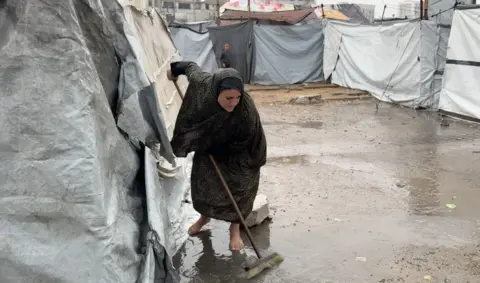
Palestinians have told the BBC that many tents - brought in by international agencies and Gulf donors - have been stolen and are available on the black market in Gaza.
They say that with a small increase in supply, prices have dropped from about $2,700 (2,330 euros; £2,050) before the ceasefire, to around $900-$1,000.
There are pleas for international help to distribute more shelters, more fairly.
"I hope everyone will join with us to end this crisis we're living through," says Alaa al-Dirghali in Khan Younis. "The tents endured two years under the sun and two years under the rain and they couldn't last this downpour."
"Until this moment, people are re-erecting these broken tents because they don't have any alternative. I pray to God that those responsible for handing out tents will give them to those who actually need them. They're getting stolen and sold to people at a very expensive price."

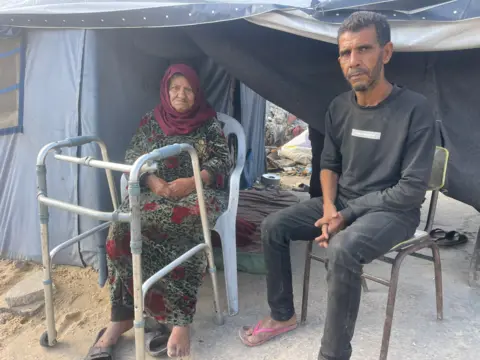
In Gaza City, Rami Deif Allah, who was displaced from Beit Hanoun, was drying out soaked mattresses in the weak sunshine, with his elderly mother and children.
He said a relative had given him a waterproof tent but that it was still flooded.
"We evacuated about 11 times and there was no safe place for us so we took shelter in these humble tents but it was all in vain. When the rain came they couldn't protect us," he said. "The water flooded us from above and below."
Like all Gazans, Rami longs for a permanent dwelling.
"We pray for this war to be fully over, and for everyone to return to their homes," he went on. "Even if we don't find our houses standing, with our sweat and blood we will rebuild. This situation of living out on the streets is unbearable."
So long, plastic wet wipes - but should we be flushing the new ones?

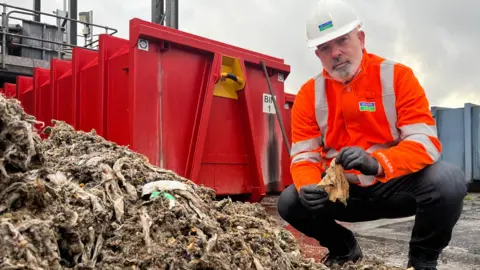 Jonah Fisher/BBC
Jonah Fisher/BBCLong the scourge of water companies for blocking pipes, a ban on the sale of wet wipes made of plastic will be signed into law later today.
The new rules will come into force in 2027 and will bring England into line with legislation across the rest of the UK.
Plastic wipes don't disintegrate when flushed down the toilet, so when oil and fat congeal on them, so-called fatbergs form in sewers, which water companies say cost them £200m a year to clear.
Most of the wipes that are sold in the UK are now made of non-plastic materials but the government and water companies say they should not be labelled as "flushable" because they can still cause blockages.
The wet wipe manufacturers contacted by the BBC said their non-plastic "flushable" wipes have been thoroughly tested and comply with all the rules.

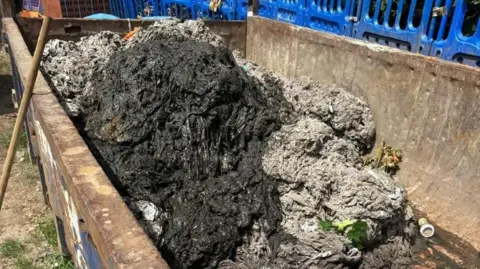 PA Media
PA MediaFatbergs can become huge if the blockage is not cleared.
Just last month a massive stinking lump of wet wipes, fat and oil was removed from a west London sewer. It weighed the same as eight double-decker buses and took a specialist team more than a month to break down.
The market for wet wipes has been growing steadily for years. According to government figures in 2023, 32 billion wipes were sold to UK consumers of which about 12 billion contained plastic. If they were all laid out flat that's enough to cover 2,200 football pitches with plastic wipes.
Though they welcomed the new legislation for England, water industry sources were also quick to point out its limitations.
UK companies will still be able to manufacture and export plastic wet wipes, and they will still be available for people to buy from pharmacies both in person (behind the counter) and online. Businesses like hotels will be allowed to buy the wipes, without restrictions.
The medical profession successfully argued for an exemption from the wet wipe ban, arguing that non-plastic wipes absorb too much of the detergents and disinfectants impregnated in them, with potential consequences for patient safety.
At Minworth Wastewater Treatment works in the Midlands the scale of the current problem can be both seen and smelt.
Minworth serves a population of more than two million people across Birmingham and the Black Country and Severn Trent, who run the facility, say 10 tonnes a day of wet wipes end up here.
"It's a nightmare," Grant Mitchell, Severn Trent's head of blockages says, as we survey a small mountain of wipes.
He's just shown us the area where the "un-flushables" are filtered out from the sewage. It's grotty stuff. There are dead rats, a rubber duck as well as a huge ball of soiled wipes.
"Wet wipes are a problem because they're made to not break down like toilet paper," he says. "So they stay in one piece, and they gather together with fat, oil, and grease from kitchens, congeal and create a fatberg which causes flooding."
Also on hand at Minworth is Emma Hardy the Minister for Water and Flooding.
"It's going to make a huge difference," Emma Hardy, the Minister for Water and Flooding, said of the ban as we sheltered from the rain at Minworth. "I think people maybe underestimate the amount of problems that these wet wipes cause."

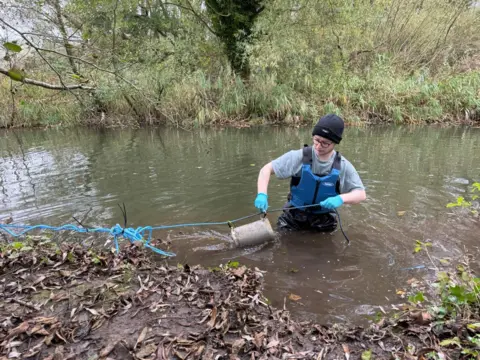 Daniel Jolly/University of East Anglia
Daniel Jolly/University of East AngliaWhile many brands say their wipes are "flushable" and environmentally friendly, whether they can and should be disposed of down the toilet is being questioned.
Daniel Jolly is researching how fast these biodegradable wet wipes break down. In a lab at the University of East Anglia in Norwich we watch as he simulates what a toilet flush does to a wipe.
"This isn't toilet paper" he says as the wipe slowly breaks apart into fibres while he stirs the water inside an tank. "Even though it's the same basic materials, this is built completely differently and it's much stronger."
Jolly has been carrying out tests on the banks of the River Yare to see how quickly the plastic-free wipes disintegrate.
"It's a period of most likely months to a year, or two years, depending on the environmental conditions that they're in," he says.
"That's much slower than toilet paper which is between weeks to several months, but much better than a plastic wipe which can last hundreds, even thousands of years in certain situations."
Research commissioned by the government found that some non-plastic wipes failed tests on how fast they disintegrated, meaning they could still block sewers.
Jolly is now looking at what impact the biodegradable wipes have on aquatic life as they fall apart.

 Jonah Fisher/BBC
Jonah Fisher/BBCUntil March 2024 the water companies ran a certification scheme which gave the green light for some wipes to be put in the toilet, called "Fine to Flush". But that was discontinued because of fears it was causing confusion among consumers and replaced with a new slogan "Bin the Wipe".
Now the advice from the government and the water companies is very clear. Only the three P's - pee, paper and poo should be put down the toilet.
"Restricting the sale of wet wipes containing plastic is a step in the right direction," said a spokesperson for Water UK, the industry's trade body. "But we really need a ban on their manufacture and mandatory 'do not flush' labelling on all wet wipes."
Some of the manufacturers who market "flushable" wipes told the BBC that they were in fact moist toilet tissues, but Water UK said it still viewed them as wet wipes so they shouldn't be flushed.
"I would encourage them [the wet wipe manufacturers] to show leadership on this right now," says Minister Hardy.
"Instead of marketing them as being flushable, provide labelling to inform the public that they need to bin them and not flush them down the toilets."
Additional reporting by Gwyndaf Hughes
KPop Demon Hunters star on how her life mirrored main character's journey

 BBC
BBCThis is part of the Global Women series from the BBC World Service, sharing extraordinary interviews and stories from around the globe.
"I hated that I looked Asian, that I didn't have blue eyes and blonde hair, because that's what was beautiful at the time," says Arden Cho, the actress who voiced Rumi, star of Netflix's chart-topping animated film, KPop Demon Hunters.
Cho, 40, is describing her childhood in Texas, as the eldest daughter of Korean immigrant parents and her struggle for acceptance in American society.
In the film, which tells the story of a female K-Pop trio who must save the world from evil forces, Rumi has to come to terms with her identity as part human, part demon - and when Cho first read the script this resonated powerfully.
"Being born in America, feeling American but having people treat me like I'm not, trying to figure out my identity as an Asian-American, as a Korean-American, as a woman," she says.
These were all elements of her early life that mirrored Rumi's journey.
"I can honestly say that at different points in my life, I hated a lot of myself and I wanted to be someone else.
"As kids, what you see shapes who you become and I feel like I just didn't see enough people that look like me."

 Netflix
NetflixWhen it launched on Netflix in June, KPop Demon Hunters registered 33 million views in just two weeks, and reached the top 10 of the Netflix charts in 93 countries. To star in the first Hollywood animated film set in Korea, with Korean leads, was for Cho "a dream come true" – but it has also made her a powerful role model for Asian-American children, of the kind that she lacked when she was young.
Cho says many Korean-Americans have told her it's "such a refreshing moment", making them proud for the first time of their dual heritage and culture.
"I feel like K-Pop really, truly, has paved the way. K-beauty has had such a big impact on Korea being loved. But I feel like this movie is the one that tipped it over the edge of, everybody wants to go to Korea, now," Cho says.
But the film's success was not guaranteed and Cho says she felt the team making it were "sometimes facing an uphill battle".
"I feel like it kind of sucks to say this, but any time there's an Asian-led project, people feel like it's a risk," she says.
So, when she took on the role, she made an effort to meet everyone working on the film in person, she says.


The film was released against the backdrop of increased immigration raids in the US as part of the Trump administration's mass deportation effort, which sparked protests in many states.
As an Asian-American living in the US "it's heartbreaking and disappointing," says Cho. "Immigrants have made America what it is."
Korean news sources have estimated that up to 150,000 Korean immigrants without proper documentation, including adopted children, are among those who could be deported.
As an adult, Cho came to realise that the racism she had experienced when she was younger stemmed mainly from a lack of education, as people didn't know what it meant to be Korean or Asian.
"But now in this day and age, when I feel like the world and people should know better, it is beyond disappointing and sometimes I feel like we feel so hopeless," she says.
Because of this, it feels very special, she says, that KPop Demon Hunters could bring "hope and joy and love to all these different communities".
"Maybe that's why it's sort of like this movie of the summer, because we just needed some hope and something to unite us all together."

 Getty Images
Getty ImagesThe growth of AI is a major concern for the film industry, raising the possibility that in future it could be used to make a film like KPop Demon Hunters.
Cho says she is aware that AI is already being used to replicate actors' voices, but wants to "have hope in humanity" that people will still seek out art created by humans.
"Sure, I'm sure they're going to have AI actors and singers. I know they already exist. I know our voices are already being manipulated, but I hope people have some respect and want and love for something real."
KPop Demon Hunters has also been dominating the global music charts, with seven tracks from its soundtrack featured on the Billboard Hot 100. It has its own fan art, and audiences around the world are demanding a sequel.
Cho tells us she wishes she could answer the question of whether that will happen - but both she and fans will have to wait for Netflix or Sony Pictures Entertainment, which made the film, to give it the green light.
"I know there's lots of murmurs, I've heard wonderful things," she says. "So we shall see, and I think everyone in the world would riot if there wasn't."


- Starting conversations, building connections and challenging misinformation through features, investigations, interviews and extraordinary stories
Dan Wootton denies High Court claim that he catfished 'former colleague'

 Getty Images
Getty ImagesBroadcaster and journalist Dan Wootton has responded to a court claim against him, denying that he catfished a man who says he was a former colleague.
Earlier this year, the man filed a case claiming that in 2009 he was tricked by Wootton into sending him explicit photographs of himself as well as an explicit video.
He says Wootton did this by sending him sexualised messages, pretending to be a woman called Maria Joseph.
In documents filed at the High Court, Wootton denies ever communicating "via any medium" with the man, who has been granted anonymity by the court.
Wootton also denies that he "ever has been in possession" of any "explicit photographs or video" portraying the man.
Explicit photos and video
The anonymous claimant has previously told the court that in 2009 Wootton communicated with him via email, SMS and Facebook.
The man says that at the time he believed he was communicating with a woman called Maria Joseph, and did not know that he was, in fact, communicating with Wootton, according to the claim.
The man says that the messages soon became "sexualised and flirtatious", and that Wootton sent him photographs of a female which, he claims, Wootton falsely pretended were of the woman the claimant thought he had been communicating with.
He says that some of the photographs showed the female partially or fully naked.
The man also said Wootton sent him a video of a man and a woman having sex, again pretending that the female in the video was the woman whom the anonymous claimant thought he was communicating with.
Wootton denies the claims
In documents filed recently at the High Court, Wootton said it was denied that he "communicated with the claimant via any medium - including email, SMS or Facebook; and denied that he sent the claimant any images or videos".
The anonymous man also previously said in his claim that believing that he was communicating with a woman, he responded to the messages in a flirtatious and sexualised manner.
He said Wootton (pretending to be Maria Joseph) encouraged him to send explicit photographs of himself.
The man added that "in the induced belief that he was communicating with Maria Joseph, an unknown female who was interested in a sexual relationship", and who had already sent explicit images of herself, he was "persuaded to and did send" explicit photographs of himself as well as an explicit video.
Wootton says in court documents it is denied that he "was or ever has been in possession of any flirtatious or sexualised messages from the claimant, or explicit photographs or video portraying the claimant".
He also said in the documents that the anonymous claimant did not believe that the recipient of his messages was called Maria Joseph.
Wootton added that the claimant stated to Maria Joseph: "Maria (if that is really your name)... we are in a catch 22. i can't play without finding this out. won't tell them as i'm not gonna advertise the fact i have apparently started to chatting to hot strangers on the internet. or tell me your real name then? [sic]".
Pain, injury and humiliation
The anonymous claimant is suing Wootton, saying that he has suffered pain, injury, humiliation and hurt to his feelings. And that he has sustained loss and damage because of Wootton's actions.
He says that he has suffered from major depressive order and use of alcohol.
Wootton has said that he does not accept that the anonymous claimant has suffered "any injury as a result of any communication of messages, images, and/or videos between him and 'Maria Joseph'."
He has denied that he and the man were former colleagues, and said the man's claim should not be allowed, because any case should have been brought years before.
Staff wellbeing 'crisis' forcing teachers out of schools, charity says

 Getty Images
Getty ImagesTeachers' wellbeing across the UK is at its lowest level since 2019, according to the charity Education Support.
Its latest report says the education workforce is in "crisis" and warns "young people's education will suffer" if more is not done to keep teachers in the job.
Teaching unions in England said schools were facing a "tsunami of stress and pressure", and teachers were being "driven out of the classroom at a time when children needed them most".
A Department for Education (DfE) spokesperson said the government was "restoring teaching as the highly valued profession it should be", adding that last year had seen one of the lowest rates of teachers leaving the profession since 2010.
Education Support's annual Teacher Wellbeing Index measures the stress, mental health and wellbeing issues reported by teachers and school leaders across the UK.
More than 3,000 education staff registered with the YouGov polling service responded to questions about their mental health and wellbeing between June and July this year.
The charity's findings suggest:
- 76% of education staff who responded reported feeling stressed
- 77% said they had experienced symptoms of poor mental health due to their work
- 86% of senior leaders said they felt stressed, with many reporting signs of burnout and exhaustion
The report also used the Warwick-Edinburgh Mental Wellbeing Scale (WEMWBS), which scores a person's wellbeing according to how often they report feeling optimistic, relaxed, or close with other people, for example. Those scores are then added together to give an overall picture of the respondent's mental wellbeing, with higher scores indicating a more positive mental outlook.
Compared with the general population, the teachers and school leaders who responded to the survey had a lower wellbeing score. The report's education staff wellbeing score was 43, compared with overall population scores of 51 in England and Northern Ireland, 49 in Wales, and 48 in Scotland.
The responses of more than a third (36%) of education staff produced a WEMWBS score of less than 41, indicating probable clinical depression.
Education Support chief executive Sinéad McBrearty said: "We urgently need a national retention strategy that puts staff wellbeing at its core.
"Without this, more teachers will leave the profession, and more children and young people's education will suffer."

 Hilary Mitchell
Hilary MitchellFormer head teacher Hilary Mitchell left the profession over Easter this year, after 32 years in teaching, including five years as a primary school principal in Walsall.
"It got to the point where that's all there was," she said.
"I was so exhausted when I got home. I couldn't sleep. It was making me very irritable, because of the constant demands and never feeling like you're doing a good enough job."
It's a decision which made her "extremely sad", she said, and which was not part of her career plan.
"In my head I'm a young 56-year-old. I had energy to give, but I just feel like it was being beaten out of me," she said.
"I really enjoyed my job, and it was the best school in the world. But it was more and more demands, more pressure, but less resources and funding."
Simon Hart, principal of Springwest Academy in west London, said his school had brought in a "culture of kindness" to promote feelings of staff belonging, trust and self-esteem.
His school has lessons from 09:00 until 16:00 from Monday to Thursday, which means the school can close at 13:40 for staff and students every Friday.

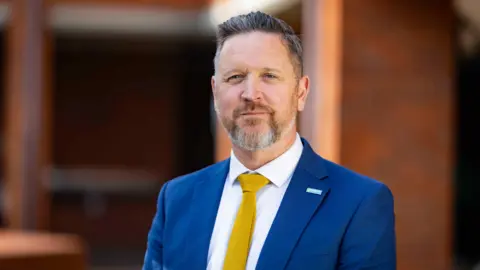 Cleverbox
CleverboxThe school also offers online parents' evenings for staff and parents, something he says is "a huge wellbeing offer that's very popular".
The school encourages staff to get to know one another with regular coffee and cake breaks, and the system for enforcing rules around behaviour is ran by the school's leadership team - rather than the teachers.
"In education, a lot of teachers leave because of behaviour - it's not managed," Simon says.
Taking detentions and other behaviour issues out of the teachers' hands means they "can just get on and teach".
He says the approach has had a positive impact on attainment, school culture and the retention of staff.
Teacher wellbeing is an issue the government is trying to improve as part of its manifesto pledge to recruit 6,500 new teachers.
But earlier this year, analysis by the National Foundation of Educational Research (NFER) said unfilled vacancies were at a record high and recruitment into teacher training remained "persistently low."
Teaching unions are calling for wellbeing, workload and support to be a priority for the government.
The National Education Union (NEU) said it was a "system in crisis", with NASUWT adding that teachers were being "driven out of the classroom".
The Association of School and College Leaders said the "many positives" of teaching were "increasingly being undermined by a tsunami of stress and pressure".
And the National Association of Head Teachers said "real movement is needed to shed some of the huge burdens our dedicated teachers and leaders carry, show they are valued, and restore teaching as a truly rewarding career."
The DfE said it was already delivering on its manifesto pledge around recruiting and retaining teachers, and said the government was "taking action to tackle poor pupil behaviour, high workload and poor wellbeing" among staff.
HMRC's suspension of child benefit payments 'cavalier' - MPs

 Getty Images
Getty ImagesThe UK tax office took a "cavalier" approach to child benefit checks when it decided to strip payments from thousands of claimants after wrongly assuming they had permanently relocated out of the UK, a group of MPs have said.
Payments stopped when HM Revenue & Customs (HMRC) ceased cross-checking travel records with claimants' tax data to prove they were in the UK.
Treasury Select Committee chair Dame Meg Hillier said it had made a "costly error" by dropping key assessments.
HMRC boss John-Paul Marks apologised and said several changes had been made to improve the process including reinstating employment checks.
Writing to the Treasury Select Committee, Mr Marks said by the end of October, about 15% or more than 3,600 of the 23,794 claimants who were flagged as potentially ineligible due to their travel history, were confirmed to still qualify for child benefit.
In September, HMRC began a crackdown on child benefit fraud which it believes could save £350m over the next five years.
Child benefit is paid to 6.9m families but runs out after eight weeks living outside the UK.
Many people affected complained HMRC had stopped their money after they went on holiday for just a short time. In some cases benefits were stopped because the tax office had evidence of a claimant leaving the UK, but not returning.
The HMRC's pilot programme used Home Office data on passengers departing the UK, as well as other tax payments such as PAYE to identify whether a claimant had arrived back in the UK.
Mr Marks said the additional cross-checks against UK tax and payroll data were dropped after the pilot was extended, in order to "streamline the process".
Dame Meg said: "HMRC is absolutely right to look at innovative ways to fight fraud and error in our system.
"I'm afraid, though, that it appears they have been cavalier with people's finances, making the arbitrary decision to remove necessary checks and causing a mess they are now forced to clean up."
Mr Marks said he apologised to thousands of claimants who stopped receiving funds because of this "streamlining".
The HMRC chief executive also outlined plans to give claimants at least one month to provide proof they are eligible for the benefit if travel data suggests they are no longer in the UK, and payments will not be paused at the start of an investigation.
Welcoming the apology, Dame Meg warned MPs would question HMRC in the new year about "the lessons they have learned from this mistake".
Paralegal sacked after offering to help dodge £60k illegal working fines
A paralegal who was secretly filmed telling a BBC undercover reporter how he can help businesses avoid fines of up to £60,000 for employing illegal workers, has been sacked.
At a solicitor's office in Huddersfield, Zohaib Hussain said he could "make documents" including "business agreements" for a fee of £3,500 to help dodge immigration fines.
His employer, RKS Solicitors, confirmed he had been "permanently dismissed" a day after the investigation was broadcast and a "police report" had been made.
Mr Hussain previously said he categorically denied "all allegations, insinuations, and claims".
The Home Office announced an "urgent investigation" involving the National Crime Agency and multiple police forces following a series of BBC reports into organised criminal networks operating on High Streets the length of Britain.
They exposed how a Kurdish crime network is enabling migrants to work illegally in mini-marts across the UK.
Our investigation also uncovered a man at the centre of an immigration crime group who said he had "customers in every city" and could enable illegal working.
Following the reports, senior politicians warned that the crime networks were acting as a pull factor for illegal migration to the UK.
In one of the investigations, an undercover reporter posed as a mini mart owner who had received a fine from immigration enforcement worth up to £60,000 for employing illegal workers, and met with Zohaib Hussain.
During the meeting at a solicitor's in Huddersfield, Mr Hussain fired questions at our reporter about his cover story.
"How many illegal workers? So how much is the fine? How many times did they catch you?"
Then, with a chuckle, he asked what was sold in the mini-mart: "Do you sell vapes? Legal or illegal? Bit of both as well?"
Mr Hussain went on to explain how to avoid the fine. He said: "Sometimes we might have to make documents," said Mr Hussain, such as "business agreements".
Our undercover reporter then asked if the fine would be transferred to someone else's name. Mr Hussain said that would be "the last resort."
Before the meeting ended, Mr Hussain warned that the immigration authorities would want to jump on the fine straight away - making a cutting-motion across his throat.
He said his charges would be £3,500 and he "would look after us".
During the whole meeting with Mr Hussain, a man known as Shaxawan was present in the room.
Shaxawan was revealed by the BBC as a man at the centre of an organised crime network involved in the facilitation of illegal working.
He told undercover journalists that he and his associates could help migrants - including asylum seekers - to set up businesses illegally and "confuse" immigration enforcement.
In Companies House listings, Shaxawan is named as Kardos Mateen, a British resident in his 30s, and has been the director of 18 businesses across the north of England, including many High Street mini marts.
Mr Hussain asked our undercover reporter to share any future Immigration Enforcement letters with Shaxawan.
In a previous statement to the BBC, Mr Hussain said: "For clarity, the individual named in your correspondence, Mr Shaxawan Jawad, is not associated with me in any capacity; professional, personal, or otherwise."
He added: "I have never been involved in, nor have I facilitated, encouraged, or condoned, any form of illegal or improper activity."
Shaxawan, otherwise known as Kardos Mateen, told us by email that he categorically denied "every allegation, insinuation and claim made" in our reporting, and said that he was "not employed by, associated with, or acting on behalf of RKS Solicitors in any capacity".
In a earlier statement, RKS Solicitors said it had informed the Solicitors Regulation Authority (SRA).
"Mr Hussain is employed as a paralegal under strict supervision… The individual is not authorised or instructed to provide immigration and tax advice."
The firm did not comment on Shaxawan Jawad. It said it did not condone unlawful conduct and was committed to the "highest standards of professionalism, integrity, and public service".
West Yorkshire Police said it "is working in close partnership with the Home Office, which has assumed primacy for the investigation into the matters highlighted in recent BBC reporting".
A Chinese firm bought an insurer for CIA agents - part of Beijing's trillion dollar spending spree

 Getty Images
Getty ImagesSince 2018, the United States has been tightening its laws to prevent its rivals from buying into its sensitive sectors – blocking investments in everything from semiconductors to telecommunications.
But the rules weren't always so strict.
In 2016, Jeff Stein, a veteran journalist covering the US intelligence community, got a tip-off: a small insurance company that specialised in selling liability insurance to FBI and CIA agents had been sold to a Chinese entity.
"Someone with direct knowledge called me up and said, 'Do you know that the insurance company that insures intelligence personnel is owned by the Chinese?'" he remembers. "I was astonished!"
In 2015, the insurer, Wright USA, had been quietly purchased by Fosun Group, a private company believed to have very close connections with China's leadership.
US concerns became immediately clear: Wright USA was privy to the personal details of many of America's top secret service agents and intelligence officials. No one in the US knew who might have access to that information now the insurer and its parent, Ironshore, were Chinese-owned.
Wright USA wasn't an isolated case.
The BBC has exclusive early access to brand new data that shows how Chinese state money has been flowing into wealthy countries, buying up assets in the US, Europe, the Middle East and Australia.

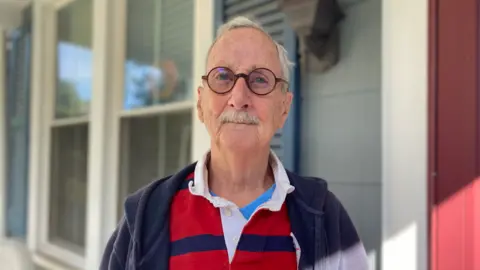
In the past couple of decades China has become the world's biggest overseas investor, giving it the potential to dominate sensitive industries, secrets and key technologies. Beijing considers the details of its foreign spending overseas – how much money it's spending and where - to be a state secret.
But on the terms of the Wright USA sale, Stein says: "There was nothing illegal about it; it was in the open, so to speak. But because everything's intertwined so closely in Beijing, you're essentially giving that [information] up to Chinese intelligence."
The Chinese government was involved in the deal: fresh data seen by the BBC reveals that four Chinese state banks had provided a $1.2bn (£912m) loan, routed through the Cayman Islands, to allow Fosun to buy Wright USA.
Stein's story ran in Newsweek magazine. And there was a swift reaction in Washington: triggering an inquiry by the branch of the US Treasury that screens investments, the Committee on Foreign Investment in the United States (CFIUS). Shortly after, the company was sold again - back to Americans. It's unclear who ordered that sale.
Fosun and Starr Wright USA, the company that now owns Wright USA, did not respond to a BBC request for comment.
High-level US intelligence sources confirm the Wright USA sale was one of the cases that led the first Trump administration to tighten its investment laws in 2018.
Very few could have understood at the time that this Chinese state-backed spending appears to have been part of a much bigger strategy carried out by Beijing to invest and buy assets in every continent.
"For many years, we assumed that virtually all of China's money flows were going to developing countries," says Brad Parks, executive director of AidData. "And so, it came as a great surprise to us when we realised that actually there were hundreds of billions of dollars going into places like the US, the UK and Germany, happening right underneath our noses."
AidData is a research lab based in Virginia that specialises in tracking how governments spend their money outside their borders. It's based at William & Mary, one of America's oldest universities and it gets its funding from governments and charitable organisations around the world. For the past 12 years, AidData has had a major focus on China.
A four-year effort involving 120 researchers has led to the first known effort to tally all of China's state-backed investments around the world. The group's entire dataset is available open source although the BBC was given exclusive advance access.
AidData's key discovery: since 2000, Beijing has spent $2.1 trillion outside its borders, with a roughly equal split between developing and wealthy countries.

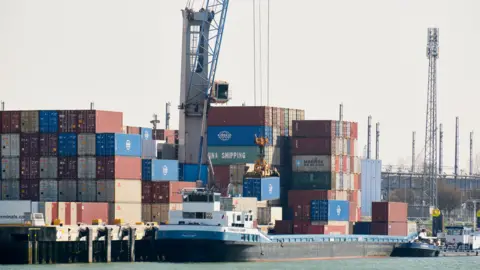 Getty Images
Getty Images"China has a kind of financial system that the world has never seen," says Victor Shih, director of the 21st Century China Centre at University of California San Diego. China has the largest banking system in the world – larger than the US, Europe and Japan put together, he adds.
That size, along with the amount of control Beijing exerts over state banks, gives it unique capabilities.
"The government controls interest rates and directs where the credit goes," Mr Shih says. "This is only possible with very strict capital control, which no other country could have on a sustainable basis."
Some of the investments in wealthy economies appear to have been made in order to generate a healthy return. Others fall in line with Beijing's strategic objectives, set out a decade ago in a major government initiative called Made in China 2025.
In it the Chinese authorities outlined a clear plan to dominate 10 cutting-edge industries, like robotics, electric vehicles and semiconductors by this year.
Beijing wanted to fund big investments abroad so key technologies could be brought back to China.
Global alarm at the plan led China to drop public mention of it, but Victor Shih says it "stayed very much alive" as a guiding strategy.
"There are all kinds of plans still being published," he says, "including an artificial intelligence plan and a smart manufacturing plan. However, the mother of all plans is the 15th five-year plan."
At a key meeting of the Communist Party last month, China's leaders set the goal of accelerating "high-level scientific and technological self-reliance and self-improvement" until 2030.
AidData's new database highlights state-backed spending overseas that matches the 10 sectors targeted in 2015. The BBC's earlier reporting detailed how the Chinese government bankrolled the purchase of a UK semiconductor company.
The United States, the UK and many other major economies have tightened their investment screening mechanisms after each country appears to have been caught off-guard by deals like the sale of the insurer, Wright USA.
AidData's Brad Parks says wealthy governments didn't realise at first that Chinese investments in each country were part of Beijing's larger strategy.
"At first blush, they thought it was just a lot of individual initiative from Chinese companies," he says. "I think what they've learned over time is that actually Beijing's party state is behind the scenes writing the cheques to make this happen."
However, it must be underlined that such investments and purchases are legal, even if they are sometimes obscured within shell companies or routed through offshore accounts.
"The Chinese government has always required Chinese enterprises operating overseas to strictly comply with local laws and regulations, and has consistently supported them in conducting international co-operation based on mutual benefit," the Chinese embassy in London told the BBC.
"Chinese companies not only provide quality products and services to people around the world, but also contribute actively to local economic growth, social development and job creation."
China's spending patterns are changing, the AidData database shows, with Beijing's state money flowing to countries that have decided to welcome Chinese investment.
In the Netherlands there's been debate around Nexperia, a troubled Chinese-owned semiconductor company.
It shows up in the AidData database too – Chinese state banks loaned $800m to help a Chinese consortium acquire Nexperia in 2017. Two years later, the ownership passed to another Chinese company - Wingtech.
Nexperia's strategic value was highlighted when the Dutch authorities took control of the company's operations in September - in part, the Dutch government said, over concerns that Nexperia's technology was at risk of being transferred to other parts of the larger Wingtech company.
That bold move had resulted in Nexperia effectively being cut into two – separating Dutch operations from its Chinese manufacturing.
Nexperia confirmed to the BBC that its Chinese business had stopped operating within Nexperia's governance framework and was ignoring instructions.
The company said it welcomed China's commitment to resuming exports of its critical chips to global markets.
Xioaxue Martin, a research fellow at the Clingendael Institute in The Hague, says many in the Netherlands were surprised at how the government handled the case, since they've always managed their relationship with China carefully in the past.
"We're a country that has always done very well with open trade, free trade. And this is really the merchant side of Dutch policy," she says. "Only recently we found that actually, hold on - geopolitics makes it necessary to have more industrial policy, to have this investment screening, when in the past there wasn't that much attention for this."
Xiaoxue Martin is clear – it's easy to go too far down the path of fearing what could happen as a result of doing so much business with a superpower like China.
"There's a danger of making it seem as if China is this monolith, that they all want the same thing, and that they're all out to get Europe, and to get the United States, when obviously that's not the case," she says.
"Most companies, especially if they're private, they just want to make money. They want to be treated as a normal company. They don't want to have this negative reception that they're getting in Europe."
If China is so far ahead of its rivals in its plans to buy into sensitive sectors, does that mean the race to dominate these arenas is already over?
"No! There's gonna be multiple laps," maintains Brad Parks. "There are many Chinese companies that are still trying to make these types of acquisitions. The difference is, now they're facing higher levels of scrutiny to vet these inbound sources of foreign capital.
"So China makes its move. China is not the follower any more, it is the leader. It is the pace setter. But what I'm anticipating is that many G7 countries are going to move from the back foot to the front foot.
"They're going to move from defence to offence."











